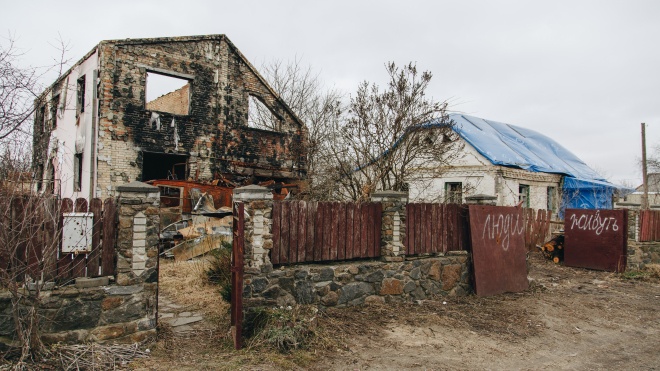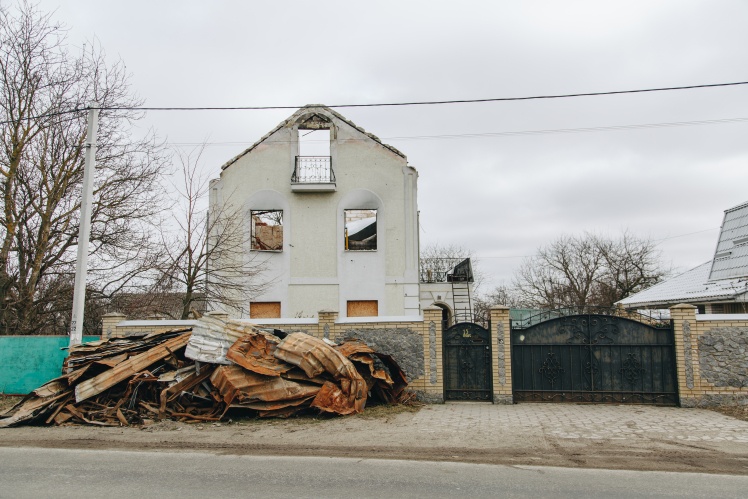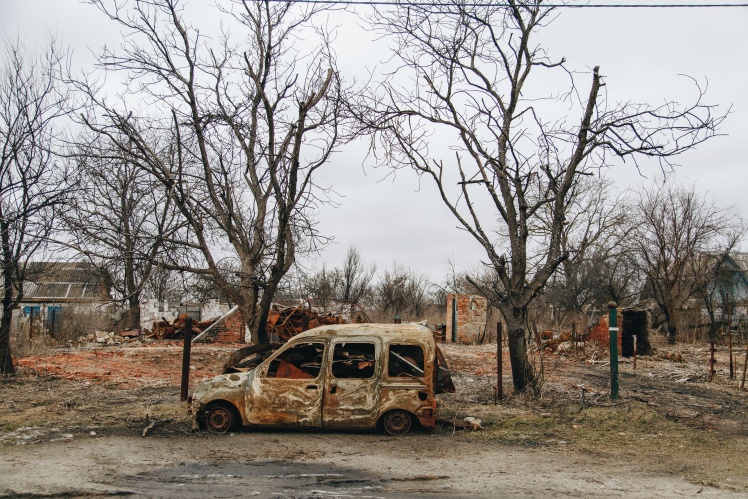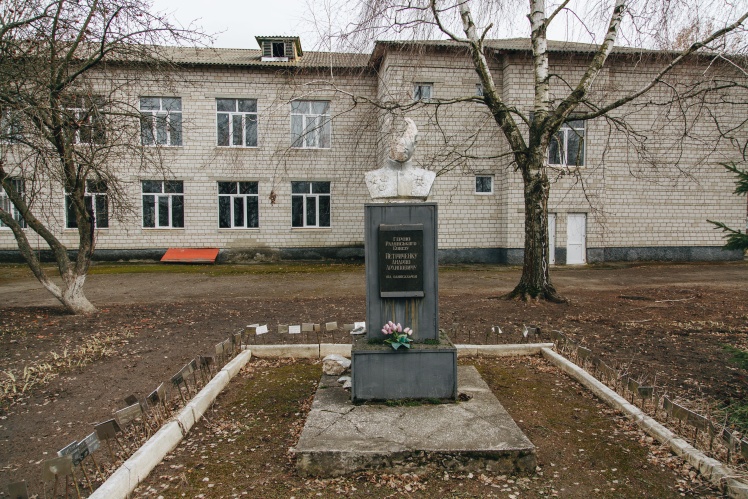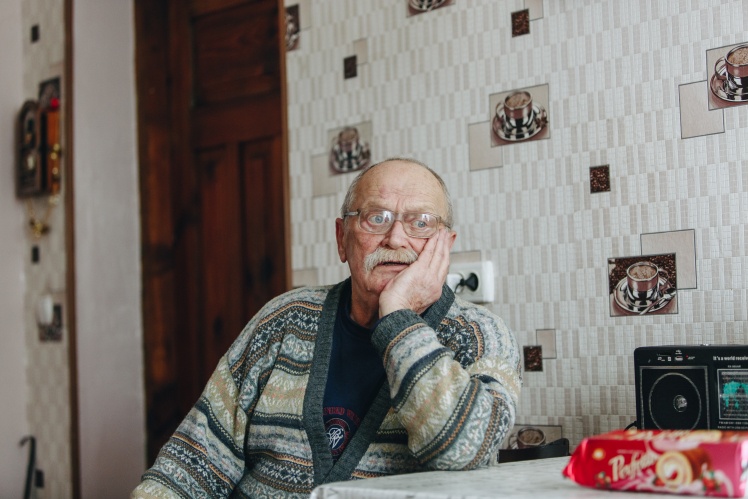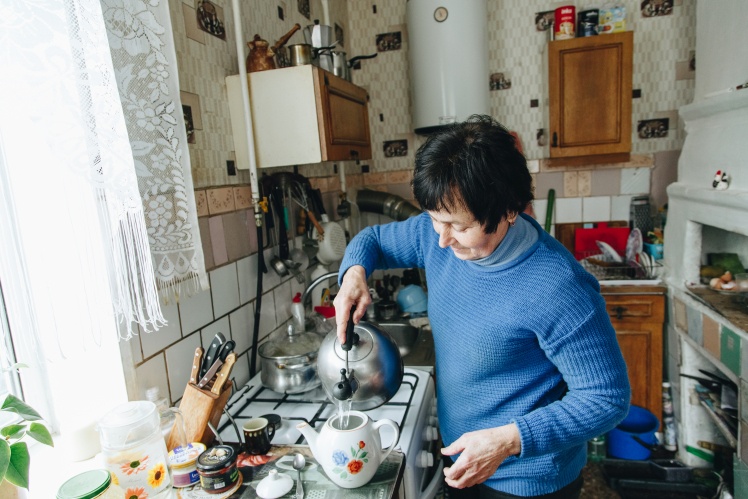1.
Before the war, Andriivka was a typical Ukrainian village. Asphalted road, school, small clinic, shop, village council, post office. There are only ten streets and about a thousand residents. Kyiv isnʼt far away — in an hourʼs drive. Thatʼs why the village also has country houses of Kyivites.
When a full-scale war broke out, the village was unlucky. The road from the border with Belarus to Kyiv passes through it. And itʼs only 40 kilometers to Irpin city from there. The Russians entered Andriivka at 11 a.m. on February 27. A huge column of military equipment passed through the main street of the village without any obstacles. The Ukrainian Armed Forces werenʼt located there, and no more than 25 people signed up for territorial defense (TD) two days before. All they had were hunting weapons — carbines and rifles. The Russians rode in tanks, armored personnel carriers, "Grads" and "Solntsepyoks". Four such convoys passed through Andriivka in two days. The latter stopped at a farm on the outskirts of the village. Andriivka found itself in the line of fire. The Russians shelled houses, arrested those suspected of collaborating with the Armed Forces of Ukraine and the TD. People were kidnapped and tortured. Thirteen men were shot. Practically everyone who was later found had their hands tied behind their backs.
"Many of the killed were lying on the road, we didnʼt know who they were," Vitaliy Cherkasov tells Babel. He is 57, an entrepreneur, and has two automobile repair shops in Kyiv. “For three days in March, the bodies of a woman and two men lay on the bridge between the lakes, people heard someone being tortured in one of the houses.”
After the liberation of the village, large blood stains were found in this house. Cherkasov recalls: the Russians drove around the village on a trailer pulling tanks and collected the killed. He himself was also wanted, because on February 25, Cherkasov joined local TD. The invaders lived in his house and held his family hostage — his wife, daughter, brother, and mother-in-law. They threatened to shoot them if they did not tell where Vitaliy and TD fighters are now.
Andriivka was liberated on March 31. Every third house on the central street named after Oleksandr Mel was completely destroyed or severely damaged by shells. In total, there are more than four hundred such houses in the village.
After the liberation, the humanitarian aid literally poured into the village — clothes, dishes, food. Once a car full of fresh bread came into the village. Yevtushenko also came to the queue, but it didnʼt work out — fellow villagers attacked him with curses. Women shouted that during the occupation he worked for the Russians, baptized them and betrayed people.
After that, SBU employees came to Yevtushenkoʼs house. Cherkasov was with them. He recalls: the investigators spent almost an hour asking what the "monk" did during the occupation, whether he helped the Russians. Yevtushenko denied everything and showed the SBU the shell fragments he found in his yard. According to him, the house survived because he recited protective prayers.
The "monk" and the investigators talked and parted ways, and a week later, on April 20, Yevtushenko was arrested and sent to the Lukyanivska Prison. Investigators said people gave evidence against him.
Houses in Andriivka were shot with "Grads" and from tanks. In the village, there are still burnt cars on the streets. Russian soldiers shot down a monument to the Hero of the Soviet Union, Andriy Petrichenko, who died during the Second World War.
Діма Вага / «Бабель»
2.
One of the main witnesses in the case against the "monk" is Leonid Udod. He and Yevtushenko are the same age (both 76 years old) and are related (their wives are cousins). And Leonid is the godfather of the eldest son of the "monk" Volodymyr. In a word, heʼs his best man.
“He always had a flattering and fake smile,” Udod describes Yevtushenko. “I did not love him, but he is the father of my nephews, so I perceived him as a relative. They used to visit us when they were young. We argued a lot about the Russian church. He tried to convince me that it was good, and I was always in favor of the Ukrainian one.”
During the occupation, Russians came to Udods with searches — they drove on an armored personnel carrier, jumped into the yard with weapons. They began to search the barn, the house, the garage. Leonid and his wife Tetyana were taken outside and sat on a bench next to the dog. The questioning began.
“The Russian commander said that he was looking for the main “Banderovite” in the village. He said: "You were told about by a monk. We are looking for a monkʼs best man. He burrs and his wife is beautiful. Are you the best man?” Leonid remembers. “I told him that yes, I am. The Russian looked at me and said that I am very old, and they need a younger person. I thought that they were looking for my nieceʼs husband, Vitaliy Cherkasov, because he is in the territorial defense.”
The Russians decided to arrange a personal meeting of Leonid and the "monk", but couldnʼt find the latter one, and they did not come to Udods anymore. Leonidʼs wife Tetyana recalls that as soon as the Russians left, her neighbor Katya came running.
“Did you see who told Russians about you? Petrovych [this is Yevtushenkoʼs patronymic]! He was walking through the streets, and when the Russians passed your yard, he told them to go back,” Tetyana cites her neighbor. “We were so scared. We sat down and didnʼt know what to think. Mykola was our relative and friend.”
Leonid Udod. Tetyana Udod.
Діма Вага / «Бабель»
In the village, the "monk" has few friends. He isnʼt local, he came to Andriivka in Soviet times from the Chernihiv region: was assigned to work at a local school. He taught chemistry. He sang and danced well. He was an ordinary Soviet teacher, of no religion.
“Ninaʼs mother, my aunt, liked him,” Tetyana recalls. “She was also a teacher, and Nina taught, and so did I. Ninaʼs father worked as an accountant at the school. They persuaded their daughter to marry him.”
A few years later, a young family of teachers was given a one-room apartment in Kyiv. Yevtushenko went to work at a Kyiv boarding school for children with hearing impairments, then at another boarding school for children with mental disorders. Nina worked in one of the regular Kyiv schools. The couple had two sons. And then the teacher was convicted of molesting minors in boarding schools. Tetyana does not remember the year when it happened. Just recalls this was in the early nineties.
“Nina cried all the time, asked not to ask anything. Then she got divorced,” recalls Tetyana. “Petrovych served, it seems, four years and after his release went to Mount Athos. He was there for a long time, returned, and started everything from scratch. He said that in prison he turned to God, that he was either an accomplice or a novice on Mount Athos.
Yevtushenko had no home of his own, and his ex-wife allowed him to live in Andriivka in her parentsʼ house. Tetyana herself came to Andriivka from Kyiv only for the weekend. Mykola lived in the attic. He decorated it with icons, began to wear a cassock — thatʼs why he is called a "monk".
Now he is engaged in folk medicine. He told people which herbs are better to drink so that their legs donʼt hurt, what to do when a child is sick. One day, “slides happened" to him — thatʼs how they call that event in the village. Sashko, a teenager, ran up to Yevtushenko. He said that his back hurt.
“And he tells him: "Lie down and take off your panties." Sashko grabbed his pants and ran away,” another neighbor of the "monk", Sashkoʼs grandmother, Sofia Petrychenko, tells Babel.
In the village, she is called "Grandma Sonya”. She is over eighty, short and agile. She knows everything about everyone. Grandma Sonyaʼs house is opposite the "monkʼs". She also testifies against him in court and does not hide that she hasnʼt loved him for a long time.
Grandma Sonya was at home during the entire occupation. The Russians forbade people to go out into the streets. Then she sat in the house or went outside, from where the "monkʼs" yard can be seen. Sofia says that when the Russian convoys went through the village on the first day, she was outside. She saw that a "monk" in a cassock went down the street to meet the military equipment. He reached the pond, which is two hundred meters from the road along which the column was moving, and began to baptize everything around.
Later, when the Russians entrenched themselves in the village, they began to visit Yevtushenko. They didnʼt jumped in in with weapons like to others, but several people entered the yard through the gate and sat in the house for several hours. The "monk" together with the Russians drove somewhere to the center of the village on cars that they took from the residents of Andriivka and painted with the letter V.
Halyna Prykhodko lives on the same street as the "monk" — she is also a prosecution witness. She is 72 years old, has diabetes, which causes pain in her legs and high blood pressure. It is difficult for her to speak and she doesnʼt particularly want to. She says that she never quarreled with the "monk" because, although they live on the same street, they did not communicate.
During the occupation, ten Russians settled in her house. She and her mother, who is 93 years old, lived in one half of the house, and the occupiers lived in the other. The military ordered her to prepare food. The woman was afraid to refuse, but a few days later she got sick and stopped cooking.
Halyna recalls that the "monk" came to the Russians several times. They drank tea and talked. But she didnʼt hear what exactly they were talking about. Yevtushenko once sang in her house, but she does not know whether it was a rite of baptism or something else. Halyna tried not to catch the eyes of the Russians.
The house of the "monk". He lives in the half where there are no curtains on the windows.
Діма Вага / «Бабель»
3.
Yevtushenkoʼs family has its own version of this story. His two sons, Volodymyr and Andriy, and nephew Vasyl and his wife came to his defense. Elder Volodymyr has been fighting in TD since the first days of the full-scale invasion, so he was not in the village during the occupation. Andriy was with his father, but on March 4 he left for western Ukraine, and from there to Germany to treat his daughter, who suffers from epilepsy. Vasyl lives in the Kyiv region, he hired a lawyer for his uncle and drives him to court hearings. The "monk" house has two owners. One half belongs to Vasyl.
During the six months that the trial has been going on, neighbors and both of Yevtushenkoʼs sons have already testified. The latter one — via video conference. On the day when Andriy testified, Babel correspondent Ghanna Mamonova was in the hall.
Andriy and his family arrived in Andriivka on February 24. On the 27th, when enemy equipment moved through the village, he and his father were at home. Andriy remembers how he climbed into the attic and filmed what he saw for the Ukrainian Armed Forces. According to him, the father used to write down all the data on the first floor: which equipment was running, how much of it. Then they sent all this to the internet chats of the TD and the Armed Forces of Ukraine. Due to the explosions, which did not subside, his wife began to worry about her daughter — she might start convulsing.
“Father saw this and began to walk around the house and pray. I told him that it was dangerous outside. And he — that he lived his life. Then he went to the pond, read protective prayers there, and crossed everything on the four sides,” says Andriy.
Andriy and his family left the village on March 4. Mobile communication in Andriivka didnʼt work, and he does not know what happened to his father during March. But he constantly repeats: his father is a very religious person and baptizes everything around him. He crosses the door when he opens it and crosses withe he closes it.
“My father lives according to his strict rules. The locals donʼt like these rules. My father kept telling me that they [neighbors] should be kept in "hedgehog gloves". I didnʼt pay attention to it before, but now I understand what he is talking about,” says Andriy.
According to him, all the neighbors have reasons not to like the "monk". Granny Sonya used to steal from them in the garden — this is what Andriy was allegedly told by his now-deceased mother during his lifetime. Sonyaʼs son Oleksandr likes to drink too much. And Udodʼs relatives accused his father of ruining his motherʼs life.
“Ms. Tetyana blamed her father for the fact that her mother never got married a second time. Thatʼs why they could tell something foolish now,” says Andriy.
"Monk" has not yet said anything in his defense in court. He and his lawyer refused to communicate with Babel in any form.
The church in Andriivka, where father Ioan serves. It belongs to the Ukrainian Orthodox Church of the Moscow Patriarchate. The SBU came to him after the deoccupation, but the villagers backed the priest. They said that he did not cooperate with the Russians.
Діма Вага / «Бабель»
4.
Yevtushenko is not the only one whom people in the village call a collaborator. Anatoliy Kybukevych, the mayor of Andriyivka, says that there were families in the village who hosted Russians voluntarily — "they were waiting for them". Now they have left the village.
“I headed the territorial defense, and the Russians were looking for me. They came to search my parents, threatened to kill me. It was in the first days of the occupation, in February. The address where my parents live was given to them by someone I know. She ran away with the Russians from the village,” says the old man.
In general, Anatoliy is surprised by his fellow villagers. "Monk" spent half a year in the pre-trial detention center, and when he was released, it was as if nothing had happened. He comes to the village council to scandalize, demands material assistance from the UN and to repair the running water system to his house with the local communityʼs money. And the locals communicate with him normally. He tells them about God, reads something from the Bible.
"This impresses me the most," admits Kybukevich. “I donʼt know if this is an all-forgiveness or if people donʼt care about the grief we had in the village. They walk along the same streets with collaborators, talk to them.”
Udod, who believes that his best man handed him over to the Russians, explains this behavior simply: a year after the liberation of the village, most people were heartbroken by what had happened. If the court acquits the "monk" or gives him a conditional term, then he too will live peacefully with him. Just like other neighbors.
"Life in the village is different from life in the city," says 76-year-old Udod. “Here you never know who you will have to ask for a pinch of salt tomorrow. You canʼt keep a stone in your heart.”
When Leonid Udod testified in court against the "monk", he felt sorry for him.
Діма Вага / «Бабель»
5.
The Law on Collaborators was adopted in March 2022. During the year, the court issued 126 convictions under this article. Most involved people spreading Russian propaganda on social media or persuading others to support the occupation. Sentences for this are mostly loyal — just a ban on working in law enforcement and state agencies. There are tougher ones. In the Kharkiv region, a woman who headed the education department in one of the regionʼs districts during the occupation was sentenced to five years in prison. In the Kyiv region, the deputy head of the Bucha Service cemetery, who was appointed by the Russians as the headman in the village of Syniak, was sentenced to ten years in prison.
But these are rather exceptions. Proving in court that a person is a collaborator isnєt easy. Those who openly work for the occupiers tend to flee with them. Others, who did not leave significant evidence for the future investigation, hope that they will not be touched. There is also no evidence against the "monk" except for the testimony of the neighbors. The Russians took away peopleʼs phones, so there are no photos of him christening equipment or riding cars with the occupiers.
In the case of Yevtushenko, the court heard almost all the witnesses. The prosecutor believes that the testimony is sufficient for a guilty verdict. And the testimony of Yevtushenkoʼs sons will not be considered by the court. Volodymyr was not in the village, and Andriy left at the beginning of March. While the case concerns the events that took place from March 15 to April 1. Yevtushenko faces up to 12 years in prison with confiscation of property. But, given his age, the court can give him a suspended sentence.
The flag of Ukraine in Andriivka was installed by the headman near the monument to the victims of the Holodomor.
Діма Вага / «Бабель»
How the occupation went for the Kyiv region:
- ”They lifted the sleeve and pierced the vein.” Mykola Savchuk from the Kyiv region was captured. Russian soldiers forcibly bled him, froze his leg, and deported him to Belarus. He returned home — hereʼs his story
- Russia planned to take Kyiv in 3 days, soldiers killed hundreds of civilians, destroyed towns and villages. This is how the Russians captured the north of the Oblast: the chronicled testimony of defenders and residents
Translated from Ukrainian by Anton Semyzhenko.
We are for fair and severe punishment of collaborators. And also for quality journalism. Support us in this: 🔸 in hryvnia 🔸 in cryptocurrency 🔸 via Patreon 🔸 or PayPal: [email protected].
